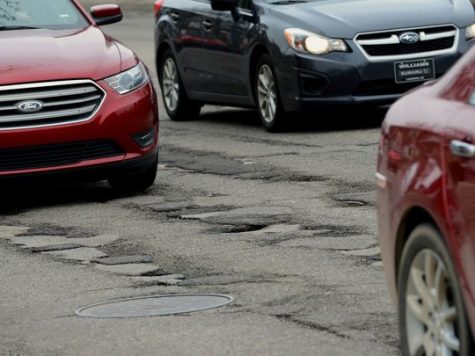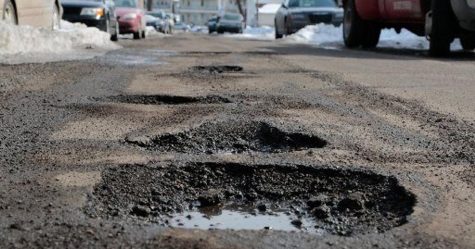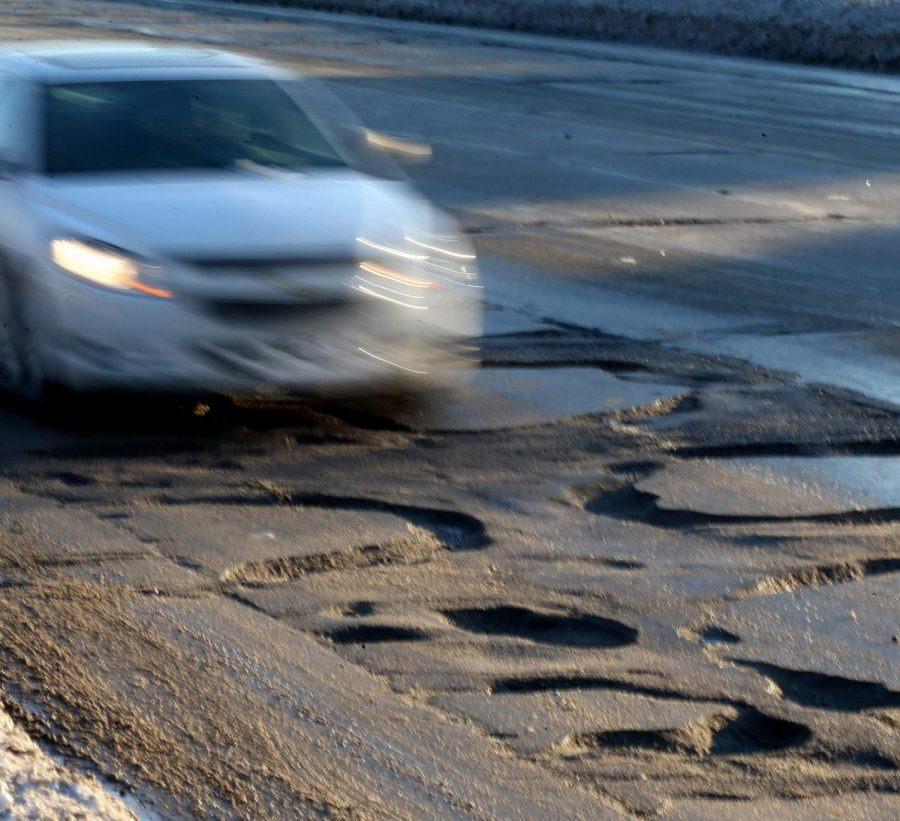Potholes take over Michigan Roads
A main road in Michigan littered with dangerous potholes.
Is Michigan weather a contributing factor to why the roads are so bad? Is Michigan the only mid-west state suffering from these dangerous holes in the roads? Why is it that Michigan only seems to put temporary band aids on the recurring potholes covering the roads?
Potholes are a natural underground cavity formed by erosion of rock through the movement of water. As we know, Michigan experiences constant weather changes, and this winter there was a statewide emergency for temperatures in the negative 40s. Three days later there was rain, and then the next day a snow day. Moisture seeps into the pavement, freezes, expands and thaws, creating a gap in the concrete. As vehicles drive over the gap, the pavement weakens leading to a pothole. Michigan is known to have the crazy weather, but the roads suffer the most.
“Michigan is unique in weather turns experiencing the most freezes and thaws then most states because of The Great Lakes,” said Ken Haddad from Clicked on Detroit.

Michigan road “repaired” with blacktop. A temporary fix for the pothole problem.
Transportation officials also explain how the Michigan weather patterns pose an increased threat on the terrible road conditions as well as the swampy soil conditions around the Detroit Metropolitan area.
“I was on my way home from school when i drove over a pothole and ended up popping my tire. It was expensive to fix and all could be avoided if Michigan improved their roads,” said senior Eli King.
Furthermore, weather is not the only factor contributing to the poor Michigan roads. In a study done in 2018 from the Reason Foundation, data explains how Michigan is ranked 33rd out of the 50 states on total funding for the roads. Michigan’s 2015 road funding deal, which will raise an extra $1.2 billion a year for roads once it is fully implemented, will increase tax on fuel of 7.3 cents per gallon and will continue to increase taxes to keep up with the cost to repair the roads. On the other hand, it is hard to raise gas prices a significant amount because Michigan gas prices are already higher than its surrounding states.
“It makes no sense that the roads in Michigan are so bad when the surrounding states are perfect. The question that I have is, is money from increasing taxes truly going towards fixing the roads? But I fully support the increase of tax on gas when the increase is for a good reason,” explains concerned citizen David Lovalvo.

Potholes in Rochester, MI.
The price of vehicle registration will increase by 20% and will eventually produce an annual fund of $600 million for road spending, explains The Detroit Free Press. Michigan is no longer known for just its cherries and cars, but now how bad the roads are.
“I believe Michigan roads are terrible because of inadequate funding and tough weather conditions and not because of the cars driving on the roads,” said parent Jeff King.
Truck drivers are now paying a fee to travel with overweight vehicles across Michigan to make their jobs easier. Since the trucks are getting heavier and heavier the citizens of Michigan are suffering from the content destruction of the roads from the trucks. Michigan’s gross weight of trucks is 164,000 pounds, but you can pay a fee to get permits for heavier trucks. The Free Press reports that truckers can pay a fee of $50 for a single trip or $100 for multiple trips for permits to exceed the states weight limits. In some cases, these permits allows the trucks weight to be greater than 1 million pounds.
“In 2013 there was 6,992 special weight permits issued-on average of 19 each day — for trucks weighing more than 164,000 pounds. About 2,820 of those permits were for trucks weighing 200,000 pounds or more,” said Paul Edgan from Detroit Free Press.
On another note, there are different types of asphalt and pothole repair materials. Each type consists of different materials, resulting in different costs. The more secure the mixture is more expensive than the average mix. The temperature is a leading factor in deciding between different options. There is a cold mix that would be used in the winter time called CMA, Calcium Magnesium Acetate, and a hot mix that would be used in the summer called HMA-hot mix asphalt.
“In my opinion the poor quality in the making of the materials that are used in the asphalt in Michigan are not the best and are low quality. The patches that are put on the holes never truly fix them,” said Caty Gitner, a teacher in the Rochester Community School District.
Not only are the roads in poor condition, but to fix them is going to be way worse because of how much money it will cost. According to The Detroit Free Press on average throughout the state only 19% of roads in Michigan are seen as in “good condition.” That leaves 81% of all roads in the state of Michigan to be categorized as fair and bad conditioned. Bill Anderson, a local government finance and operations specialist, said that $400 million a year is currently spent on concrete for about 8,000 miles of federal aid-eligible roads in Michigan. In order to change the statistics around to make 80% of the roads in Michigan to be classified as good condition there will need to be an increase in funds to $1.6 Billion a year. That is a substantial amount of money to come up with annually for what seems like easy fixes, and this would not even fix every one. The money that Michigan gets a year to fix roads comes from federal, state, and local dollars, and that is only put towards main roads and freeways. Roads in subdivisions, back roads, and urban roads are not being funded because of how expensive it is to fix. There is not enough money to fix every road, so freeways and main roads are the only ones being somewhat improved. Michigan roads have a long way to go until they will be in good condition because there are many factors that contribute to terrible Michigan roads.










